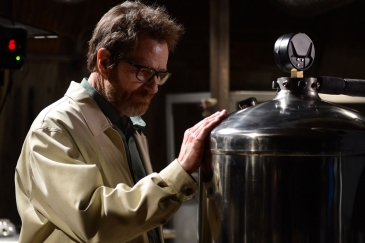Note: Spoilers follow.
At the end of the penultimate episode of Breaking Bad, Walter White sits in a bar in New Hamshire watching the co-founders of Grey Matter Technologies speaking about him. A company that he co-founded, based on his research, and then parted ways by selling his share for meager $5000 and settling as an overqualified high school teacher. Despite his crucial role in founding the company, they discredit his work and claim his contribution was merely coming up with the name of the company, in order to distance themselves from any association with a drug kingpin. Walter watches as we see fire rise within him. This is probably the lowest point in the life of Walter White: his nadir. His cancer is back, he has lost most of his earnings, he lives in a secluded town with no human contact, he is a wanted man, his family won’t talk to him, they won’t accept help or money from him, and he’s being discredited of even his good achievements from before his drug dealing days.

Walter watches his memory being dismissed by his former partners
At this point, I found myself asking 2 questions that I answer in this article:
The first: Was Walter good or bad? Just listing out the heinous things he did in the final 2 seasons seems enough to conclude that he’s not just bad but pure evil but when you look at the whole evolution of this chemistry teacher from the first season and the situations he was put in, it is not very clear he was an outright villain.
The second: What did Walter really achieve? He’s much worse now than when he learned of his diagnosis. His life has just been a downward spiral the last 2 seasons, he went from the victim to the perpetrator and he took down everything he loved or desired with him in the end. So what was the point? Did he not gain anything from any of this?
Was Walter good or bad?
The Heisenberg inside everyone
The line that separates good from bad is a very relative one. Moreover, it seems pretty obvious that there was always bad inside Walter, just as it is inside everyone. His cancer just acted as a catalyst that broke the devil free. When we begin, we see Walter as a man plagued with humiliation, a genius who has settled for the lowly job of a high school teacher. He is timid, meek and lets others make fun of him. He knows deep within, that he deserves much more but he is too passive to stand up for himself. After the diagnosis of cancer, Walter’s first act of violence is when he stands up for Walter Jr, kicking a bully for insulting his son. You can see that he feels good doing this like he is venting out years of frustration. Walter may have started his meth adventure to support his family, but he starts to feel more alive than he ever did. He feels a new high using his brilliant mind for being the best at something, for once in his life. As the series goes on, Walter sets the devil inside him free, and starts losing track of why he is doing what he is doing: he morphs into a typical kingpin, he is greedy and violent, he manipulates and lies, he wants to build an empire, he doesn’t think twice before killing, his marriage becomes a business relationship, and he loses his partner Jesse. Walter’s justification that he did it all for his family begins to crumble. However, he continues to lie to himself and everyone around him the whole time until he finally admits that he did it all for himself, that he was really good at it and he felt alive doing it. Unleashing the Heisenberg inside him felt good, and he gradually got addicted to the thrill of Heisenberg’s life.

Heisenberg waking up
So was he bad? There is a devil within everyone and although Walter may have turned evil at the end of the series, I think his metamorphosis is not something that is unreasonable for any good man in his position. I mean, I consider myself a good man, but I can see myself going down that path if I set my Heisenberg free.
Change in Sympathy
The other thing about Breaking Bad is how our sympathy for Walter changes over the course of the series. In the beginning, we are extremely sympathetic. He has a few years to live at best and rather than leaving his family completely destitute, he opts to cook meth and make exactly the amount that they will need after he’s gone. We root for him even as he commits his first couple murders of Emilio and Krazy8. We want him to succeed as he goes to Tuco’s hideout and presents himself as “Heisenberg”, as he takes on Tuco’s men and later leads Hank to finish off Tuco. It seems like the David v Goliath story: the middle-aged science geek defeats a bunch of gangsters. This sympathy benefits heavily from the way Bryan Cranston plays Walter, as a typical middle-aged dad droning and fussing about little things, with a slight slump of the shoulder and unaware of street gang languages and signs.

Walter’s hand signs 😀
The crimes begin to get more disturbing as he lets Jane choke to death, and some of us still sympathized, justifying it as something he did to save Jesse from her bad influence. When he runs over two gangsters before they can harm Jesse, we are back rooting for him. But then he orders Jesse to murder the nerdy and good-natured, Gale Boetticher, which leads to one of the most heartbreaking deaths in the series. Even as Walt justifies the murder saying it was either kill Gale or be killed by Gus, we know something terrible has happened. Yet, Walt is still a man looking out for himself, trying not to get killed, he is the victim. There is still some sympathy.
But this is where Walt realizes that there is no redemption for him, he knows at this point that “If there’s a hell, we’re going there”. This is where he stops worrying about the atrocity of the crimes he’s committing, this is when he just weighs his options and no matter how unspeakably abhorrent his best option seems, he goes for it. This is when he decides that he must kill Gus Fring (who is hell bent of killing Walter) and is willing to do whatever it takes. This is when he tries to manipulate Jesse and Mike into killing Gus, poisons the 8-year-old Brock, and actually kills Gus. This is when Heisenberg completely takes over Walter White. This is about the stage where we lose all sympathy for Walter, even though you still want him to somehow miraculously redeem himself in the end.
In the final season, it quite evident that Walter has become a monster. After being complicit in the killing of 14-year-old Drew Sharp, Walter lies to Jesse that the murder has affected him deeply, and is then seen whistling cheerily continuing his work. It is shocking how far he has come from his first murder where he made a list of pros and cons and contemplated the killing of Krazy8 for 2 days and was still unable to muster the courage to execute it. He orchestrates the murder of the nine witnesses in prison to tie up loose ends and also commits the first murder that doesn’t have any justification: he kills Mike purely because Mike insults him.

Walter’s list of pros and cons while contemplating the murder of Krazy8
Vince Gilligan (the creator of the show) wanted the audience to gradually feel unsympathetic towards Walter, and I think this is a job well done. After Jesse turns against Walt and Walt’s plan to kill Jesse goes awry leading to Hank’s death, we see Walt trying to save Hank in vain and then feeling extreme grief over his death. A hint of the Walter that now exists inside Heisenberg. But it is not until the scene in the bar in the penultimate episode that we regain sympathy for this man who has lost everything that mattered to him.
As he goes on his final killing spree in the finale, we root for him once again, he’s killing the ones that deserve to die, he’s righting his wrongs, shutting down the circle of blue meth manufacturers that started with him, and to top it all, he saves some innocents along the way and rescues Jesse from hell. There is no redemption but we can’t help but feel sympathy towards a man who lost everything, as he walks up the meth lab, a smile curling up his lips and a sense of satisfaction in the end.
Just because you are sympathetic towards Walter, in the end, doesn’t make him good, but I think if he were all bad, you’d never sympathize with him. Even during the days when he was a monster, there were flashes of his well-mannered lovable self that I couldn’t help but feel sad for.
What did Walter really achieve?
Walter set out to achieve $737,000 from his drug adventure, an amount he believed would provide for his family after he was gone. He expected to make the money quickly, retire from the business, tie up all loose ends and never go back to it. But along the way, things got ugly and by the time he was done, his family was broke, he was a wanted man, and he was so hated by the very people he had set out to provide for that they wouldn’t even talk to him. So it does look like Walter really blew it. He really didn’t achieve anything right? Well, not really.
What he really sought was not the money or the financial buoyancy of his family after his death. What he really wanted was to be significant, he wanted people to respect him, fear him and remember him. It is as he watches his former partners at Grey Matter tarnishing his memory, that he decides to get off the barstool and spring back into action. It is evident that by the time we reach the final season, Heisenberg is both feared and respected. He knows this in the finale, he is confident, calm and composed despite being in grave danger, he demands what he wants and knows people will comply.

Walter in the Series Finale, “Felina.”
As he walks down the meth lab one last time, he knows that he has ensured that his legacy of blue meth dies with him, that he has ensured that the Heisenberg name will still be significant after he’s gone, and he knows that his family will receive his money even if they don’t know it’s from him. He is happy and peaceful as he leaves the world with just a little nostalgia for the days that he lived to the fullest.


